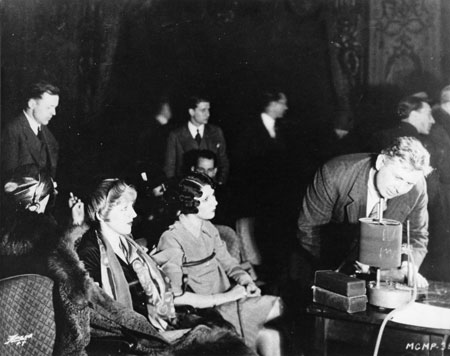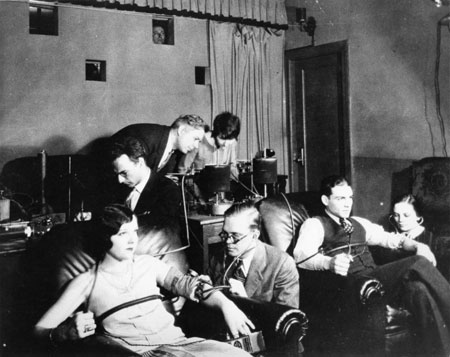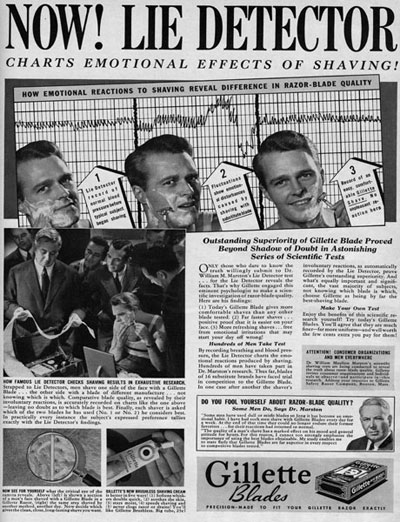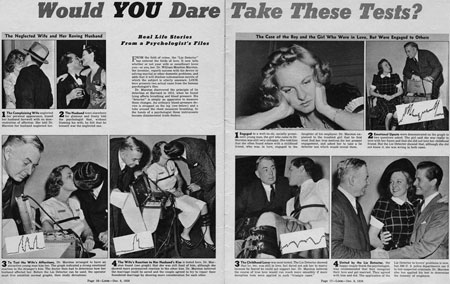WILLIAM MARSTON’S AMERICA
 With his showman’s flair, William Marston invited reporters to Manhattan’s Embassy Theater in 1928 to watch him use his lie detector to prove that blonds were more emotionally reactive than brunettes. His evidence? The response of starlets to Greta Garbo and John Gilbert making love in Flesh and the Devil. Behind Marston’s mockery of sexual conventions was his own all-encompassing theory of human emotion. Based on experiments at movie screenings and sorority hazing rituals, it posited that dominance and submission were the primordial poles of human feelings, and that both men and women enjoyed submitting to women who were themselves submissive to love. With his showman’s flair, William Marston invited reporters to Manhattan’s Embassy Theater in 1928 to watch him use his lie detector to prove that blonds were more emotionally reactive than brunettes. His evidence? The response of starlets to Greta Garbo and John Gilbert making love in Flesh and the Devil. Behind Marston’s mockery of sexual conventions was his own all-encompassing theory of human emotion. Based on experiments at movie screenings and sorority hazing rituals, it posited that dominance and submission were the primordial poles of human feelings, and that both men and women enjoyed submitting to women who were themselves submissive to love.

 In late 1928, Marston was hired by Universal Studios to pre-screen movies for emotional content, making him a pioneer of audience testing and studio self-censorship. He can be seen in the back, hunched over the machine, alongside his long-time mistress, Olive Richards, who lived with Marston and his wife and was the mother of two of his four children. He claimed to have become the movie industry’s first on-lot censor, helping pre-screen and edit such films as Show Boat and All Quiet on the Western Front. After Marston left Hollywood, Universal turned to Keeler to pre-screen and edit their horror blockbuster, Frankenstein (1931). In late 1928, Marston was hired by Universal Studios to pre-screen movies for emotional content, making him a pioneer of audience testing and studio self-censorship. He can be seen in the back, hunched over the machine, alongside his long-time mistress, Olive Richards, who lived with Marston and his wife and was the mother of two of his four children. He claimed to have become the movie industry’s first on-lot censor, helping pre-screen and edit such films as Show Boat and All Quiet on the Western Front. After Marston left Hollywood, Universal turned to Keeler to pre-screen and edit their horror blockbuster, Frankenstein (1931).

 Marston only lasted one year in Hollywood, but he didn’t give up on the use of the polygraph to test consumers’ emotional response. Back in New York, he used his device to tout products, as in this 1937 ad for Gillette razor blades. Such commercialism infuriated John Larson, who never saw that Marston was often working tongue in cheek. Marston only lasted one year in Hollywood, but he didn’t give up on the use of the polygraph to test consumers’ emotional response. Back in New York, he used his device to tout products, as in this 1937 ad for Gillette razor blades. Such commercialism infuriated John Larson, who never saw that Marston was often working tongue in cheek.

 In the 1930s Marston used his lie detector to dramatize the damage done by the lies men and women told themselves, urging Americans to free themselves from “twists, repression and emotional conflicts.” In this Look photo spread of 1938 Marston assures a young bride that her marriage can be saved, even though a stranger’s kiss is more thrilling than her husband’s. Among the multitude of pop psych articles he wrote for women’s magazines, Marston wrote one that would change his life. His piece criticizing the comics industry landed him a job on the board of All-American comics, where would soon have his greatest success as the creator of Wonder Woman. In the 1930s Marston used his lie detector to dramatize the damage done by the lies men and women told themselves, urging Americans to free themselves from “twists, repression and emotional conflicts.” In this Look photo spread of 1938 Marston assures a young bride that her marriage can be saved, even though a stranger’s kiss is more thrilling than her husband’s. Among the multitude of pop psych articles he wrote for women’s magazines, Marston wrote one that would change his life. His piece criticizing the comics industry landed him a job on the board of All-American comics, where would soon have his greatest success as the creator of Wonder Woman.
|